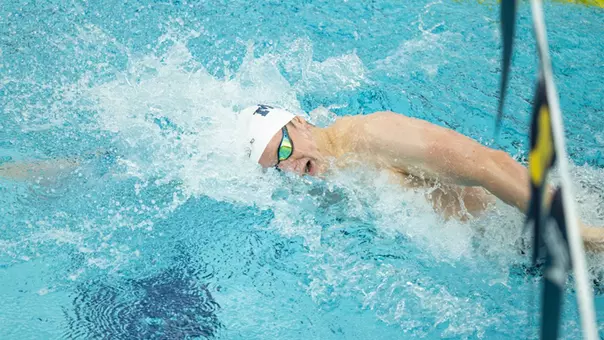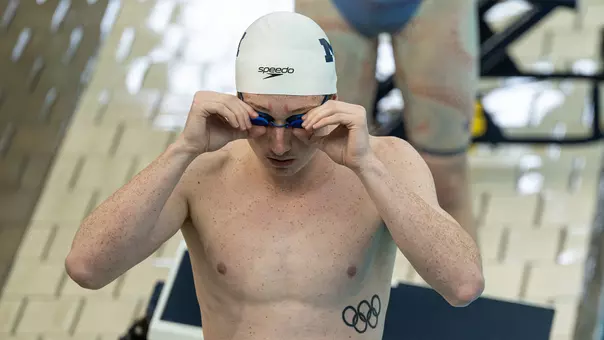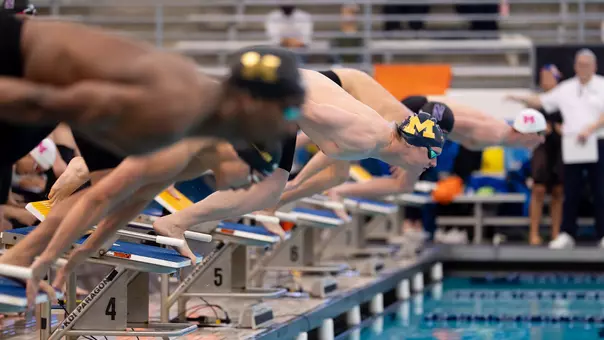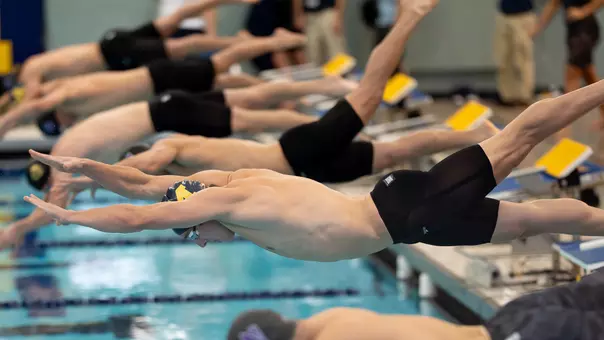A Conversation with Bob Bowman
7/31/2008 12:00:00 AM | Men's Swimming & Diving, Features, Olympics
Bob Bowman concluded his fourth season as the University of Michigan men's swimming head coach in 2008, leading the Wolverines to the Big Ten Conference title and a sixth-place finish at the NCAA Championships. He came to Ann Arbor following the 2004 Olympic Games in Athens and led U-M to a four-year record of 30-8-1, including 21-1-1 in the Big Ten. His teams never finished lower than eighth at the NCAA Championships, and his swimmers combined for six NCAA individual titles, 50 All-America honors and 37 Big Ten titles.
Bowman is the personal coach of Michael Phelps, whom he continued to train in Ann Arbor with Club Wolverine. Along with Jon Urbanchek, they coached an elite-level group consisting of eight individuals with 2008 Olympic aspirations. Among them were Phelps and U-M alum, five-time NCAA champion and 2004 Olympic gold medalist Peter Vanderkaay (2003-06). In Beijing, Phelps will be swimming the 200m and 400m IM, 200m free, 100m and 200m butterfly, 100m and 200m backstroke, and 800m free relay. Vanderkaay will swim the 200m, 400m and 1500m free, and 800m free relay. Joining them on Team USA is former U-M swimmer and training partner Scott Spann (2007-08), a five-time All-American and three-time Big Ten champion. Other Bowman proteges on the U.S. Olympic team from Club Wolverine are team tri-captain Erik Vendt and high school senior Allison Schmitt. Rounding out the impressive list is current U-M swimmer Alon Mandel, who will represent Israel in Beijing.
Bowman announced in April 2008 that he would be resigning his position as a head coach at U-M to return to Maryland as the CEO of the North Baltimore Aquatic Club, where he coached prior to taking the Michigan job. Before he left for the USA Olympic Team Trials in June, he sat down to chat with Barbara Cossman in the U-M Athletic Media Relations office.
What has been your biggest Olympic moment? My biggest Olympic moment, the one I remember the most, is when Michael (Phelps) won the 400 IM in Athens, his first gold medal, and the first gold medal of a swimmer I had coached.
You've already been to two Olympics... Three but who's counting? Three? Everybody seems to forget in 1996 that there was a co-coach for Eric Wunderlich (Michigan, '93). He left for a whole year to rehab so he could come back here right before Trials to make the team. He went to Napa, Calif. He trained with me the whole year of 1995. He won the gold medal at Pan-Pacs. He went back just for the season of the Trials. So I was there in '96 at the Olympics, somewhat involved, and of course Jon (Urbanchek) had done the Trials and he coached at the Games. So what was your official capacity at the '96 Games? I was his (Eric's) personal coach; I was listed as his personal coach. So comparing Athens to Atlanta to Sydney, how have those experiences been different or similar? I think Sydney was my favorite because I was in a position to just be part of things with really no pressure. Michael had made the team, which was already unprecedented, and we were just happy to be there. He was the youngest person there, and just being there was good and I wasn't on the official staff. I was able to actually see what life was like outside the Village and that was really fun. And then in Athens it was a lot more work, we had so much going on. So what do you expect Beijing to be like? A lot like work (laughter)! I think it's going to be better than Athens logistically and in terms of all the things that go with the meet that we were worried about in Athens. I'm not worried about security. I just think the morning will be a challenge for the finals and getting everybody in the right place at the right time. We'll just have more people to deal with. Once swimming is over, you'll stick around? I'll stay; I'm doing some stuff with my sponsors. Will you have free time, fun time? Yes, I'll have time to go to other events. Equestrian, I'm sure, but other stuff. I'd like to go to many sports, I like seeing all of them.
Now that you've experienced collegiate swimming, you've seen different levels of ability besides just the most elite level athlete. What is it about people like Michael Phelps that differentiates them from even the above-average athlete? It's a combination of factors. Clearly Michael has physical abilities that most people do not. But I think what really differentiates him from the other people who are talented, and there are a lot of talented people, is his mind set and his ability to perform under pressure. Is that a natural ability of his or does he have to work hard at that? I think it's both. He was brought into a family where they're very athletic and he understood competition. But I do think he learned over time how to manage himself, how to handle expectations and how to perform under pressure. Do you see that in any of the other people you're training here? Yeah, Peter (Vanderkaay), all the good ones. The higher level that they achieve, the better mentally they are.
American swimming: where in the international landscape does it rank? In men's swimming it's for sure No. 1. Who's next? Probably Europe in general. There are some very good Frenchmen, there are some good Australians. I don't think that there's another country that dominates like we do. We have the world record holders in virtually every event, except for most of the freestyles. We have both IMs, both butterflies, both backstrokes, both breaststrokes and the 200 free. I think that the U.S. men's team will dominate the competition. And where do the women compare? Probably second to Australia. So who do you think people should keep an eye out for in Beijing? You'd like to think Michael Phelps. Apart from the obvious, Peter Vanderkaay, I would look out for him. I would look out for this kid Eamon Sullivan from Australia. I would look for Kate Campbell from Australia; she's a super talented young girl, a sprinter. The French have had some good sprinters, Alain Bernard who just broke the world record in the 100-meter free.
What's the first thing you think you'll do when you get back from Beijing, and where exactly are you going? I don't know, I think my plane lands in Dulles (Washington, D.C.) but I have to come back here (to Ann Arbor). I don't know what I'll do. I'll probably kiss the ground. I don't know. I'm going to take some time off afterwards. To travel? Just relax? Relax. Do nothing? Do whatever.
You mentioned earlier the change in the format for prelims and finals, moving the finals to the morning. Talk about that. It was largely done by NBC so they could show the swimming finals live in prime time in the United States. Is this going to continue after Beijing? No, it's a one-time thing. And so what's the general feeling in the swimming community about that? I think it doesn't matter. The best people will be ready whenever they have to swim. But I think that in general there's some consternation about it. I think that gives the United States an advantage because we're very good at dealing with stuff like that.
Comment on Jon Urbanchek's induction into the International Swimming Hall of Fame. I think that that's the highest honor you can get in swimming and he deserves it. You've worked with him for four years, what have you learned from him, what has it been like? It has been highly entertaining. I think I've learned to chill out a little bit, and not overreact to things as much. That's pretty big for me. I think Jon's greatest attribute is his personality and how he kind of brings that to practice every day.
This is where we're going to veer off a little bit from swimming. What was your major in college? Child psychology. I have a minor in music composition. I started in music but I changed halfway through. I'm not a concert pianist, but I can play. How did you go from that, to owning horses, to becoming an elite level swim coach? What's the connection there? I don't think there's any connection really between the three except for I'm just interested in a lot of things. Obviously there's an athleticism that I'm interested in which has to do with the horses and the swimming. And I think there's an art and a science to coaching, just like there's an art and a science to music. Music is very objective, and numbers, there's a lot of stuff that goes into it, but ultimately what makes it music is the emotional content, and I think swimming in many ways is like that.
What will you miss about U-M and Ann Arbor? I'll really miss Ann Arbor; I love the town and the feel of it. The biggest thing I'll miss are the guys, that was the hardest thing. They're a great group, I recruited them here, and I'll miss them the most by far. And also the people who work at U-M.
Describe your personality in one or two words. My personality is obsessive-compulsive. Intense.
Describe your work ethic. Strong.
Who is your favorite historical figure, American or otherwise? Benjamin Franklin. He was involved in so many things on a very high level and had a real impact on our country, has an impact on everything we do today.
What do you think you'll be doing in 2012? Hopefully coaching some people for the London Olympic Games.
What's the name of your next horse? Go Barbie Go. That's cute, I like it. How do you name your horses? There's any number of ways. I named one for Peter for a lot of reasons; because I really like the Vanderkaays, not just for Peter -- they're the gift that keeps on giving! I thought the name sounded cool as a horse name. We have some swimming-related names -- we have one called Midnight Swim, we have one called Going for Gold. Sometimes you just put the parents' names together. We have some names from Willie Nelson lyrics; we have one called Pick up the Tempo, one called Coldwater Springs. The babies don't have names, and I actually have a 2-year-old who's in training that we haven't named yet. There's a yearling that hasn't been named. How many do you own? I always get it wrong, I think it's 10. What's the highest level they've reached? They've won a stakes race, Vanderkaay. It means he won at the top level. There are many different levels, but the top level is stakes racing where essentially you're running for bigger purses and everybody puts money in. You put in your 'stake' to get into the race.












